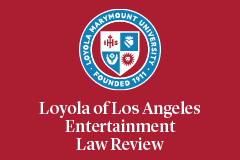Abstract
Illegal downloading continues to plague the music industry. Furthermore, the music industry has little to show for its significant investment in costly, labor-intensive copy-right litigation. Federal courts have been increasingly unsympathetic to copyright holders, refusing to let substantial damages awards in several high-profile cases stand. In addition, the Southern District of New York recently ruled that YouTube should not be held liable for widespread copyright infringement on its site in spite of substantial evidence that YouTube had actual knowledge of the infringement. Meanwhile there is great uncertainty in the world of communications law. After the D.C. Circuit thwarted the Federal Communications Commission’s (“FCC”) efforts to stop Comcast from “throttling,” or purposefully slowing, peer-to-peer file-sharing traffic on its network, the FCC drafted a new set of regulations for broadband providers. The new regulations have been challenged from every angle, and will likely be tied up in litigation for years. These legal developments have coincided with the availability of new, legal, online music services such as Spotify and Google Music. This Comment argues that music industry groups such as the Recording Industry Association of America should take advantage of the uncertainty in communications law and attempt to shift consumer behavior away from illegal downloading and toward legal online music services by engaging in a lobbying effort designed to convince Internet service providers to resume throttling peer-to-peer file-sharing services.
Recommended Citation
Brian Pearl,
Record Labels, Federal Courts, and the FCC: Using Uncertainty in Communications Law to Fight Online Copyright Infringement,
32 Loy. L.A. Ent. L. Rev. 59
(2011).
Available at: https://digitalcommons.lmu.edu/elr/vol32/iss1/4


